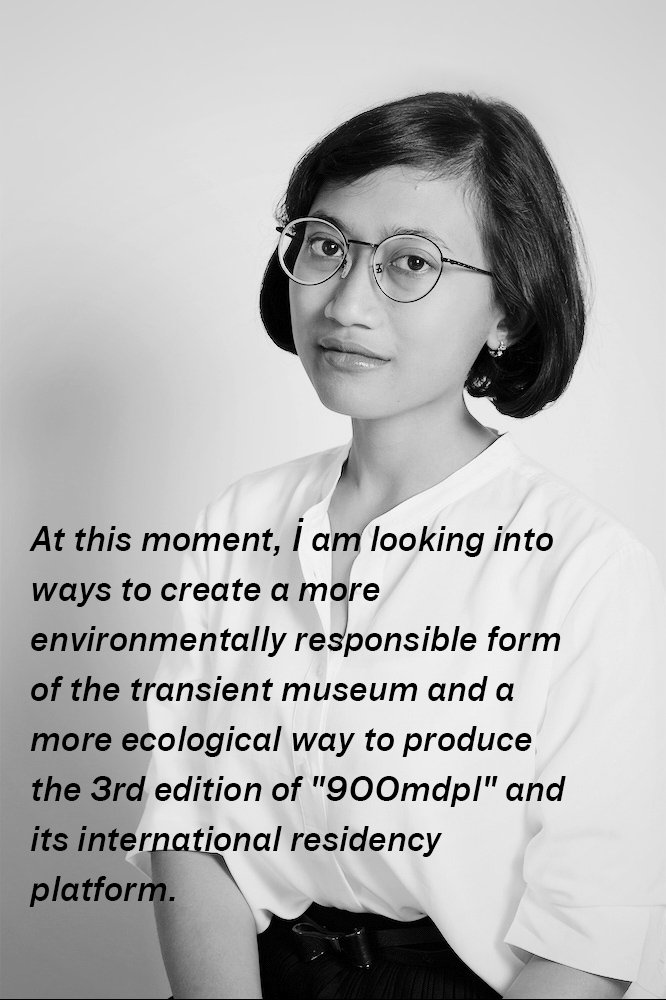"I am looking into ways to create a more environmentally responsible form of transient museum"

In 2021, 50 contemporary art curators, researchers, and museum professionals from 32 different countries were awarded support to attend the CIMAM 2021 Annual Conference, in-person and online.
For the first time, and thanks to the generous support of The Getty Foundation who sponsored the virtual platform, 27 grantees attended the conference online, while 23 attended onsite.
Launched in 2005, CIMAM’s Travel Grant Program is designed to foster cooperation and cultural exchange between contemporary art curators and museum directors in emerging and developing economies and their counterparts in other regions of the world.
Mira Asriningtyas' Conference Report
In 2017 I started a biennale site-specific art project titled "900mdpl" in Kaliurang, a resort village under Mt.Merapi, one of the most active volcanoes in Indonesia. As a continuation of the project and the effort to build a growing archive of the village and the people, together we built a prototype of the community museum "MUKKA" (Museum Komunitas Kaliurang) or also known as "The Transient Museum of a Thousand Conversation". At this particular moment, I am looking into ways to create a more environmentally responsible form of the transient museum and a more ecological way to produce the 3rd edition of "900mdpl" and its international residency platform. Through CIMAM, I wish to be connected with like-minded museum practitioners and learn from each other. The grant provided by the Getty Foundation made it possible for me not only to join (online) the CIMAM 2021 Annual Conference "Under Pressure: Museum in Times of Xenophobia and Climate Change" but also to become a member of CIMAM. It is reassuring to be part of a community like CIMAM while being part of the collective movement even without proximity. I am grateful for the opportunity.
The conference is also triggered me to think of the state of mobility/immobility that we are in at the moment. The pandemic triggered the idea of almost sculptural immobility, and it felt as if we were cursed and where we last stood was set in stone. For a short moment, it felt as if immobility would be our collective reality for the next few years. At the same time, it was a much-needed break for the earth to heal while our carbon footprints were reduced significantly. It also leads to some crucial projects around site-specificity, situated knowledge, ecological wisdom that is deeply rooted in one's context-- an increasing trend to focus on the struggle that is personally close to us and things that are happening around us.
On the other hand, it is easy to fall into the trap of regionalism. The pandemic and immobility trigger fear-induced sentiments, discrimination, and nationalistic tendencies in this increasingly divisive and divided world. It is now more than ever to be engaged in reflectivity, solidarity, and cross-continental dialogues that go deeper than identity and geography.
Such spirits of solidarity, reflectivity, and dialogue were present and humming during the three days of the conference. I believe that this feeling must be felt stronger by those lucky enough to join the conference on-site. It is important to come together physically in one place, learn about the host city's context, and once again share the intimacy and the simple pleasure of having in-between coffee sessions with old and new friends. Mami Kataoka reminded us of the importance of de-pressure, especially during times of crisis: to relieve pressure, resist the temptation to postpone joy, and take care of ourselves.
From the conference, the opening keynote by Dipesh Chakrabarty was incredibly moving. He also reminded us of the urgency of climate emergency and how the word 'Times' as written in the conference title shall always be in the plural because they are not the same time. Time of the climate emergency is a planetary time, and planetary is about connectedness between the human and the non-human. There was an exciting question specifically addressed to T.J.Demos about what it means to keep talking about the issue of climate emergency? He said it is crucial to do more than talking, but talking can be seen as a form of collective education, and it is essential to engage in a collaborative conversation that will later lead to something else. This process of anticipatory learning for the future of socio-political and spatial justice is a continuous process. Although invisible and immaterial, we might build something together in the future that emerged out of the conversation, arguments, contradictions, and constant effort to remake the world.